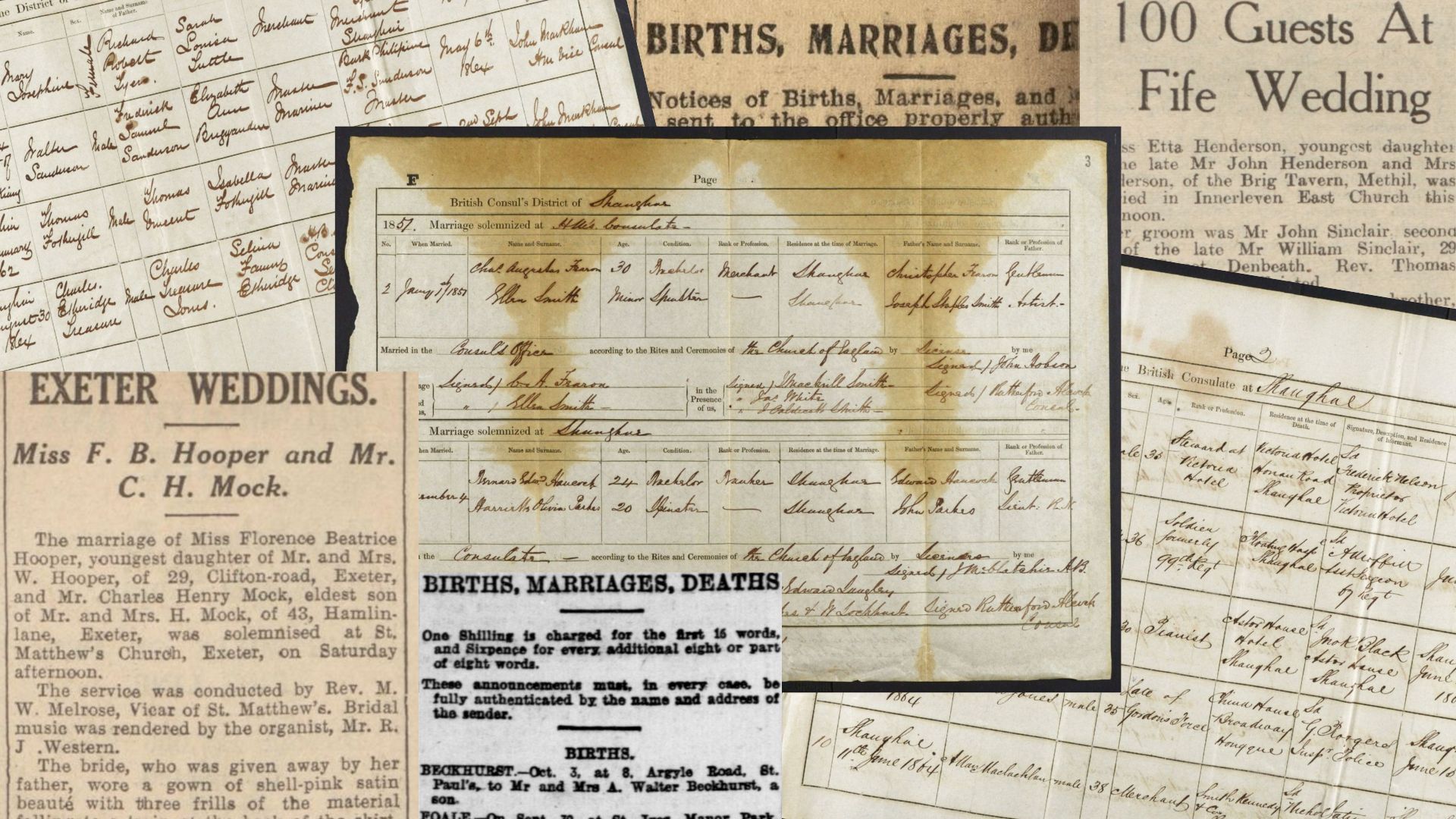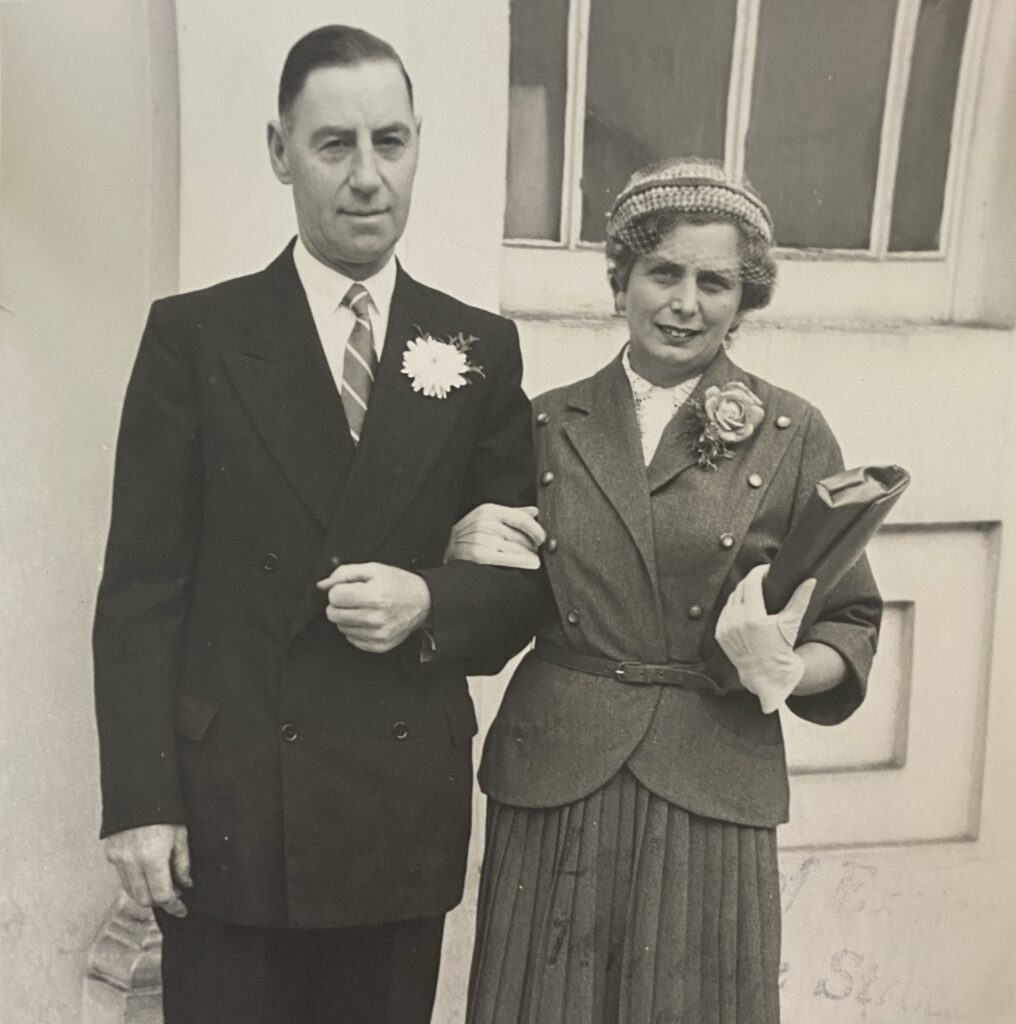│By Emma Harris, Associate Editor, Gale Primary Sources│
Gale Primary Sources offers a multitude of digital archives for all manners of historical research. But researchers may not realise that Gale’s archives can be used to explore one popular area of history – family history, or genealogy. Researching family history can often have its limitations, particularly geographical, yet digital archives help to break down these barriers, allowing researchers to find material from a range of locations that would usually not be accessible without travel.
Over the years, my family has been mapping out the history of our relatives, creating a broader picture of where we came from. So, aware of all the useful documents in Gale Primary Sources, I decided to see what extra information I could glean on my relatives, whilst also showing how certain Gale archives are especially useful for genealogical research.
Conducting Genealogical Research
There are three key pieces of information that can help you get started with any genealogical research:
- Name – a full name, including a maiden name for a woman.
- Date – an approximate date for an event related to your subject, such as a birth, death, or marriage, can help to locate that person in the correct time period. Even getting a rough idea of a period when a person lived can be a good starting point.
- Location – the place where a person was born, resided, married, or died. Location is particularly important as this is often where records are stored or newspaper articles about a person may have been published.
Combining these three pieces of information will help to increase your chances of finding documents related to the person you’re searching for.
Local Newspaper Records
Newspaper archives are a great starting place for genealogical research – they’re filled with articles reporting local news, and often include sections such as births, deaths, and marriages that offer small yet helpful pieces of information about relatives.
As opposed to some of the larger national newspaper archives Gale holds, I decided to begin my research in British Library Newspapers because of the multitude of local and regional newspapers that make up the archive. This provides a broad geographical scope that covers even some of the smaller British towns from the eighteenth to the twentieth centuries, including newspapers from York to Yeovil, and Aberdeen to Belfast. But most importantly for my family history, there are several from Devon.
Researching the Mock Family
I wanted to learn more about my grandmother’s side of the family – the Mocks – who resided in Exeter, a city in the English county of Devon. I was specifically interested in finding information about my great-grandfather’s siblings, who I didn’t know well.
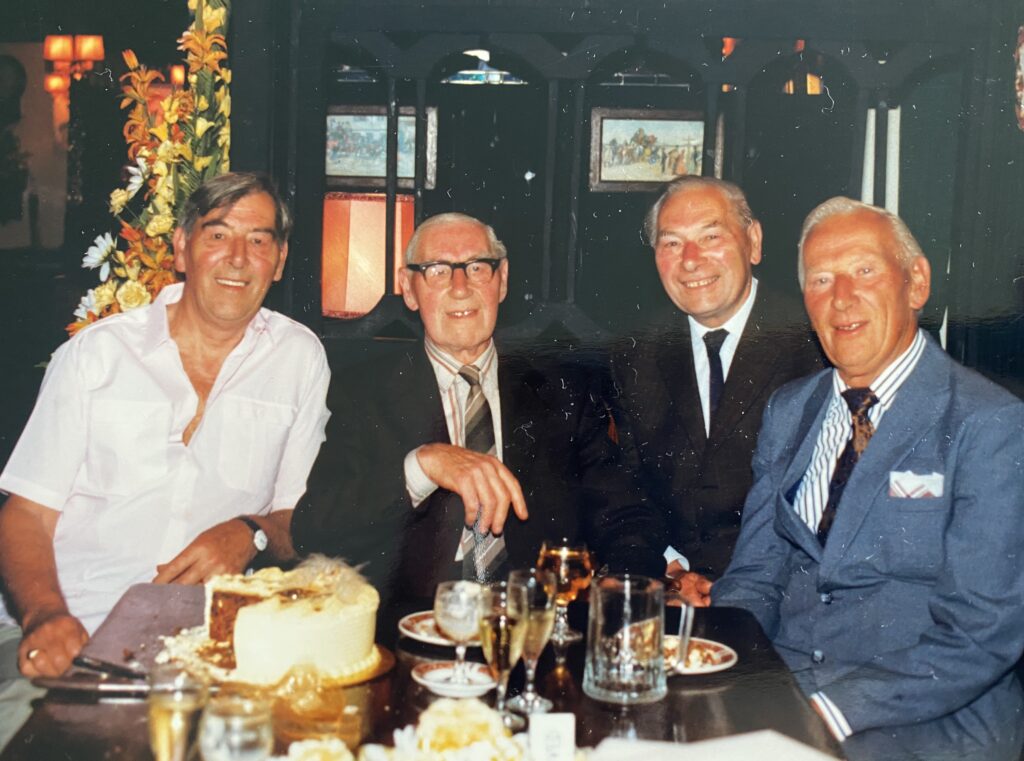
I decided to start with my great-grandfather’s oldest brother, Charles Henry Mock. Because I knew his year of birth (1905) and place of residence (Exeter), I was able to narrow down my search results immediately using the limiters in the Advanced Search. Another useful trick when searching is to use Boolean Operators (OR, AND, NOT), so that you can search simultaneously for documents that include only your subject’s first and last names as well as those that include their middle name.
Here I used the search terms “Charles Mock” OR “Charles Henry Mock” to allow for either instance of his name. With the date and location limiters set, this generated ten results for me to sift through:
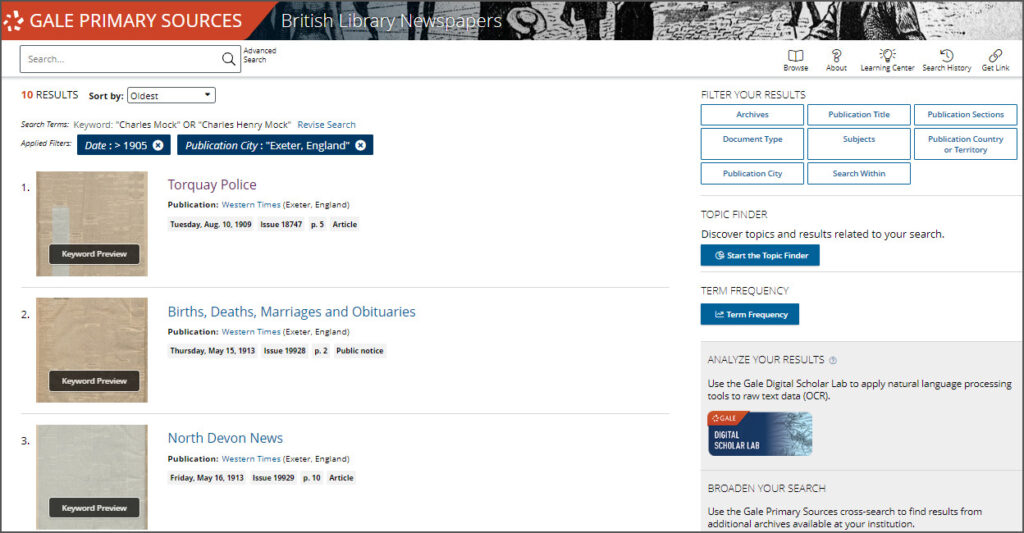
Already I could see a range of newspaper articles that offered possible stories on Charles, the first being particularly interesting. Given that it came from 1909, I was intrigued that Charles could seemingly have been involved with the police at only four years old, but a quick scan of the document showed this might have been about an older boy who rang a doorbell of a dairy and then ran away. Or maybe it was a rather naughty four-year-old Charles, though apparently another boy came forward and the case was dismissed.
Exeter Weddings
I continued trawling through the results and finally came across a promising article from the Exeter and Plymouth Gazette titled ‘Exeter Weddings’. Given that it was dated 1936, when Charles would have been twenty-one, it seemed likely this could be about him. Much to my joy, it was a richly detailed article on Charles’ marriage to Florence Hooper.
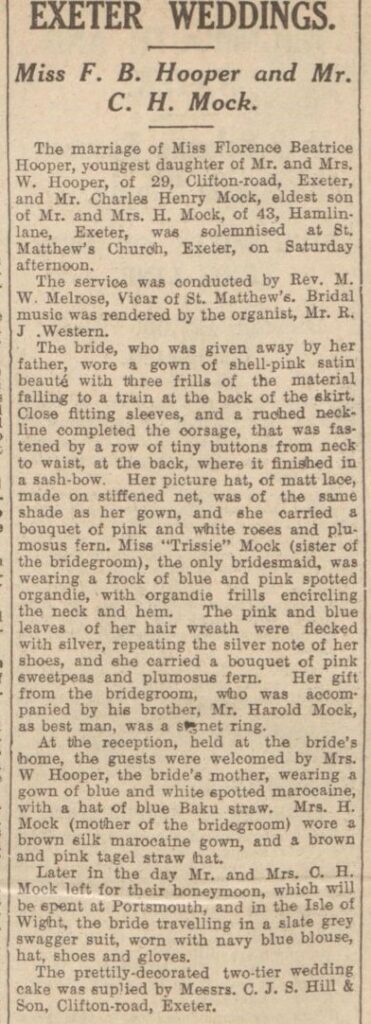
The mention of the bridegroom’s brother, Harold Mock, who I know from my own family tree was in fact Charles’ and my great-grandfather’s brother, helps to confirm that this article is about my relative.
What is particularly fascinating about this document is the detail it goes into about the outfits of the wedding party, especially the bride’s ‘gown of shell-pink satin beauté with three frills of the material falling to a train at the back of the skirt’, as well as its description of the ‘prettily-decorated two-tier wedding cake’. The thorough detail made me almost feel like I was there!
This source is also an excellent example of how one document can lead you on a path of discovery about other relatives. Several family members are noted to be present at the wedding, providing more names that I could research, and the addresses of both Charles and Florence’s parents given in the document can lead to further exploration of their lives. With just one article, I’ve been able to build out my picture of Charles Mock and his wider family.
Branching Out Across the Globe
The wealth of material for genealogical research in Gale’s archives doesn’t stop at British Library Newspapers – there are plenty of other newspaper archives that offer articles and records on relatives. Other non-newspaper archives are useful as well in providing researchers with otherwise inaccessible material.
The collections in China and the Modern World, for example, grant access to records that may only be accessible overseas. The FO 672 Foreign Office: Consulate, Shanghai, China: Miscellanea collection holds three volumes of records from 1836 to 1864, offering documentations of births, deaths, and marriages during this period in Shanghai.
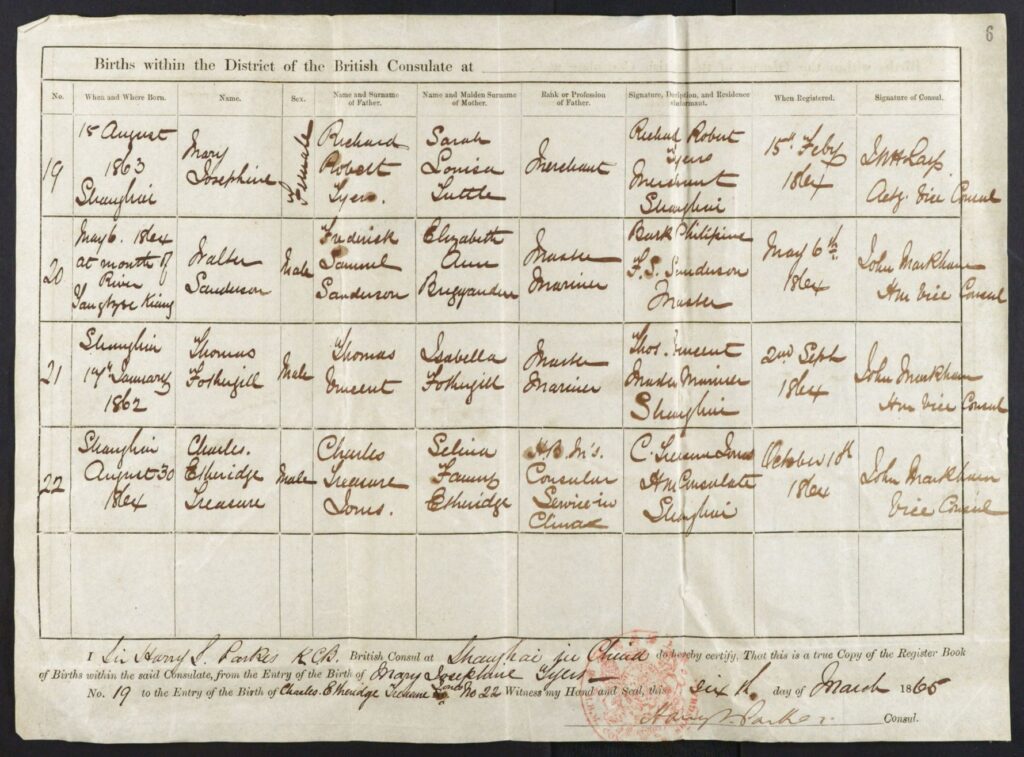
A range of court cases from the mid-nineteenth to the mid-twentieth century in Shanghai can also be found in the FO 1092 Foreign Office: Shanghai Courts, China: Judges’ & Magistrates’ Notebooks. These cases – including criminal and divorce cases, and the people involved – are detailed, providing more opportunities for research. Where one may have had ancestors across the globe, archives like China and the Modern World: Records of Shanghai and the International Settlement, 1836-1955 help to bridge the gap between geographically isolated records and may even add some extra branches to your family tree.
A Wealth of Genealogical Material
Digital archives – with their ease of access, vast geographical scope, and countless records – are a great place to begin your genealogical research and help your family tree bloom. So, next time you’re thinking about researching into your family history, make sure to give Gale’s archives a visit.
If you enjoyed reading this blog, then check out some of our other posts:
- Researching the History of Shanghai Between the 1830s and 1950s
- British Royal Babies Through the Ages
- Launch of British Library Newspapers, Part VI: Ireland 1783-1950
Blog post cover image citation: A collage of documents from the British Library Newspapers and China and the Modern World digital archives.

